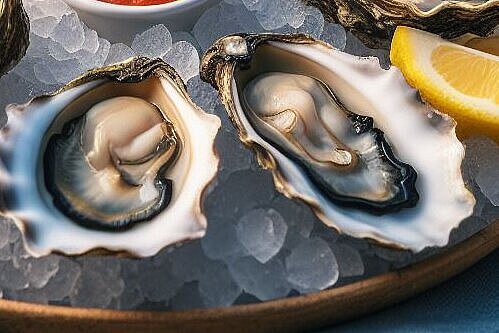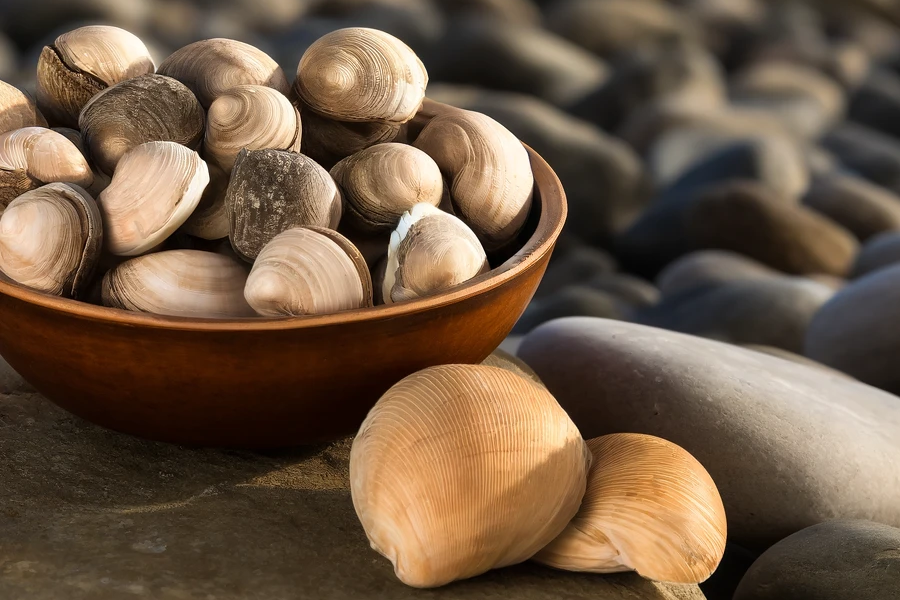Common mussel

What is the common mussel?
The common mussel is a type of shellfish found in cool, temperate coastal waters around the world. It is known for its meaty interior, which is rich in proteins, vitamins and minerals. Mussels are a sustainable source of protein and are eaten both fresh and processed. They play a role in the diet as a high-quality source of protein and are also rich in omega-3 fatty acids, which are known for their anti-inflammatory properties.
Benefits of the common mussel for dogs
Rich in nutrients
Mussels are an excellent source of high-quality protein, which is essential for building and repairing body tissue in dogs. They also contain important vitamins such as vitamin B12 and minerals such as iron, magnesium and zinc, which contribute to a dog's overall health.
Omega-3 fatty acids
The omega-3 fatty acids EPA and DHA found in mussels support skin and coat health, promote cognitive function and can help reduce inflammation, which is particularly beneficial for dogs with arthritis or other inflammatory conditions.
Supporting joint health
A specific extract of green-lipped mussel, a closely related species of common mussel, is often used in dog supplements to support joint health and relieve symptoms of joint disease.
Risks and disadvantages of the common mussel for dogs
Heavy metal contamination
Mussels can accumulate heavy metals and other contaminants from their environment, which can lead to health problems in dogs if consumed. It is important to source mussels from clean, uncontaminated waters and prepare them properly before feeding.
Allergic reactions
Some dogs may be allergic to shellfish, including mussels. Symptoms of allergy can include skin rashes, itching and gastrointestinal discomfort. When feeding your dog for the first time, you should therefore closely observe how your dog reacts to mussels.
Correct preparation
Eating mussels raw can be risky for dogs as they may contain pathogenic bacteria or viruses. It is essential to cook mussels thoroughly before feeding them to dogs to minimize potential health risks.
Safety measures and feeding recommendations
If you are considering feeding common mussels to your dog, you should take some safety precautions. Start with small amounts to test tolerance and make sure the mussels are fully cooked to eliminate the risk of pathogens. Avoid feeding mussels that come from unknown or potentially polluted waters.
While the common mussel can be a nutritious addition to your dog's diet, it's important to consider the potential risks and take appropriate precautions. Given their nutrient density and the omega-3 fatty acids they contain, mussels, when introduced responsibly and safely, can help support your dog's health and well-being.
If you notice any signs of hypersensitivity or poisoning in your dog, you should see your vet immediately. We are not a substitute for a vet, but we try to be as accurate as possible. Every dog reacts differently and we recommend you get a second opinion or consult your vet if in doubt.
Stay healthy and take good care of your four-legged friend!😊
Similar to Common mussel
Oysters are a type of seafood that belong to the shellfish family. They live in salty waters, especially in bays and estuaries, and are known to feed on nutrients dissolved in the water and...
Scallops are a type of bivalve mollusc that live in the world's oceans. They belong to the Pectinidae family and are particularly known for their white, firm meat, which is characterized by a sweet,...
Clams belong to the mussel family and are sea creatures that live in sand or mud on the seabed. They are prized as a food worldwide and are known for their nutrient-rich content, which includes...
Scallops are seafood known for their delicate taste and soft texture. They belong to the mussel family and live in sandy or muddy sea beds. Scallops are a highly prized delicacy in human cuisine and...



